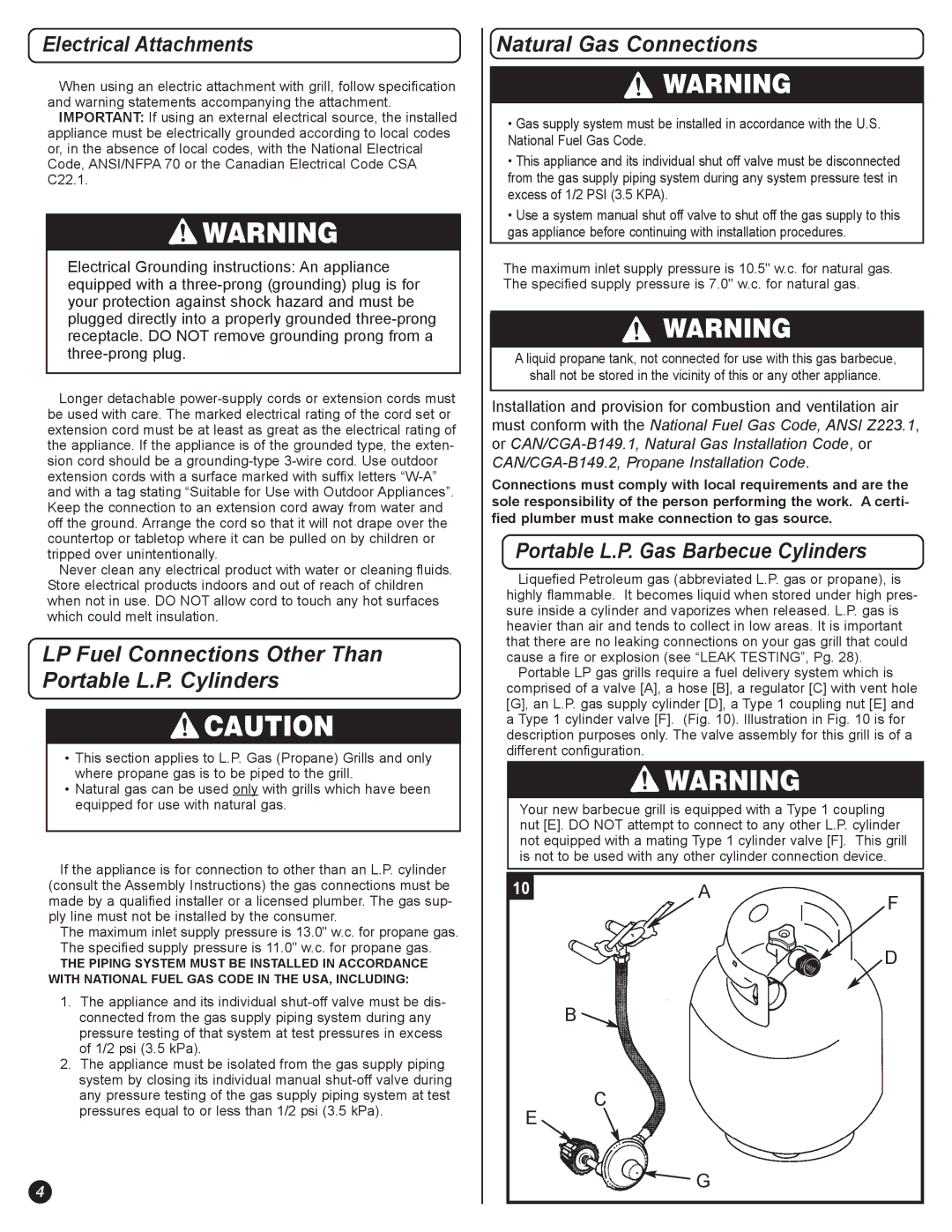
Electrical Attachments
When using an electric attachment with grill, follow specification and warning statements accompanying the attachment.
IMPORTANT: If using an external electrical source, the installed appliance must be electrically grounded according to local codes or, in the absence of local codes, with the National Electrical Code, ANSI/NFPA 70 or the Canadian Electrical Code CSA C22.1.
![]() WARNING
WARNING
Electrical Grounding instructions: An appliance equipped with a
Longer detachable
Never clean any electrical product with water or cleaning fluids. Store electrical products indoors and out of reach of children when not in use. DO NOT allow cord to touch any hot surfaces which could melt insulation.
LP Fuel Connections Other Than Portable L.P. Cylinders
![]() CAUTION
CAUTION
•This section applies to L.P. Gas (Propane) Grills and only where propane gas is to be piped to the grill.
•Natural gas can be used only with grills which have been equipped for use with natural gas.
If the appliance is for connection to other than an L.P. cylinder (consult the Assembly Instructions) the gas connections must be made by a qualified installer or a licensed plumber. The gas sup- ply line must not be installed by the consumer.
The maximum inlet supply pressure is 13.0" w.c. for propane gas. The specified supply pressure is 11.0" w.c. for propane gas.
THE PIPING SYSTEM MUST BE INSTALLED IN ACCORDANCE WITH NATIONAL FUEL GAS CODE IN THE USA, INCLUDING:
1.The appliance and its individual
2.The appliance must be isolated from the gas supply piping system by closing its individual manual
4
Natural Gas Connections
![]() WARNING
WARNING
•Gas supply system must be installed in accordance with the U.S. National Fuel Gas Code.
•This appliance and its individual shut off valve must be disconnected from the gas supply piping system during any system pressure test in excess of 1/2 PSI (3.5 KPA).
•Use a system manual shut off valve to shut off the gas supply to this gas appliance before continuing with installation procedures.
The maximum inlet supply pressure is 10.5" w.c. for natural gas. The specified supply pressure is 7.0" w.c. for natural gas.
![]() WARNING
WARNING
A liquid propane tank, not connected for use with this gas barbecue,
shall not be stored in the vicinity of this or any other appliance.
Installation and provision for combustion and ventilation air must conform with the National Fuel Gas Code, ANSI Z223.1, or
Connections must comply with local requirements and are the sole responsibility of the person performing the work. A certi- fied plumber must make connection to gas source.
Portable L.P. Gas Barbecue Cylinders
Liquefied Petroleum gas (abbreviated L.P. gas or propane), is highly flammable. It becomes liquid when stored under high pres- sure inside a cylinder and vaporizes when released. L.P. gas is heavier than air and tends to collect in low areas. It is important that there are no leaking connections on your gas grill that could cause a fire or explosion (see “LEAK TESTING”, Pg. 28).
Portable LP gas grills require a fuel delivery system which is comprised of a valve [A], a hose [B], a regulator [C] with vent hole [G], an L.P. gas supply cylinder [D], a Type 1 coupling nut [E] and a Type 1 cylinder valve [F]. (Fig. 10). Illustration in Fig. 10 is for description purposes only. The valve assembly for this grill is of a different configuration.
![]() WARNING
WARNING
Your new barbecue grill is equipped with a Type 1 coupling nut [E]. DO NOT attempt to connect to any other L.P. cylinder not equipped with a mating Type 1 cylinder valve [F]. This grill is not to be used with any other cylinder connection device.
10 | A | F |
|
|
D
B ![]()
C
E
![]() G
G
